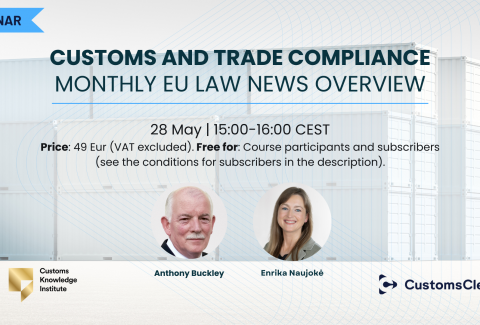EU customs in 2023 and beyond, what is coming?
2022-10-31 2022-11-07 13:22EU customs in 2023 and beyond, what is coming?

EU customs in 2023 and beyond, what is coming?
What are the central elements of the EC plan for European Customs? What are the new concepts for customs of the UK government? What is a myth and what plans are real?
Join a free webinar to learn distilled experts’ insights on these issues!
Date: 29 November 2022
Time: 15:00 – 16:00 CET
Each lecturer will do a 15-minute presentation and respond to questions. The recording of the webinar will be sent to all registered participants to study in their own time if unable to attend the live session.
Some of the speakers of this webinar are also authors and trainers in the extensive knowledge course: ‘Customs Clearance and Trade Compliance in the EU’. If you feel that systematic knowledge in the field is what you need then this training is your ultimate way to receive it.
Agenda

Anthony Buckley
‘What is planned for Europe?’ by Anthony Buckley, Chair of Customs Knowledge Institute and Kevin Shakespeare, Director of Strategic Projects and International Development at the Institute of Export & International Trade. The European Commission is finalising plan for European Customs up to 2030 while completing the implementation of the UCC up to 2025. At the same time, the UK government is introducing some new concepts for customs, which have implications for Europe. What are the central elements?

Enrika Naujokė
‘No declarations for customs? Is it a myth or is it real?’ by Enrika Naujoke, editor of Customs Compliance & Risk Management journal. The customs supervision dream is to receive data directly from the actors of the supply chain. Will the customs declaration be abolished in, let’s say, 10 years? What else is in question?

Kevin Shakespeare
‘What about customs learning?’ by Kevin Shakespeare, Director of Strategic Projects and International Development at the Institute of Export & International Trade (IOE&IT). Following the UK leaving the EU a new market for customs learning has evolved requiring an understanding of new procedures for trade in goods, trade in services and e-commerce. This also comes on top of customs authorities having to manage requirements under the WTO Trade Facilitation agreement and the advance of digital trade. All this opens new opportunities for collaboration between organisations to promote best practice and to facilitate trade.
Related Posts
Non-tariff regulation and sanctions | Online consultation
Announcement of a general meeting of all CKC members in Sofia
Preferential origin of goods: rules and proofs | Online consultation
Customs and Trade Compliance | Monthly EU law news overview: August 2024
Online consultation: Customs value of goods imported into the EU
Proving preferential origin in EU and UK | Podcast, Episode 8
Online consultation: Customs formalities when importing goods into the EU
Customs and Trade Compliance | Monthly EU law news overview: June 2024
Online consultation: Release for free circulation in the EU
Monthly EU law news overview: May 2024
Search
Recent News
- Non-tariff regulation and sanctions | Online consultation
- Announcement of a general meeting of all CKC members in Sofia
- Preferential origin of goods: rules and proofs | Online consultation
- Customs and Trade Compliance | Monthly EU law news overview: August 2024
- Online consultation: Customs value of goods imported into the EU









